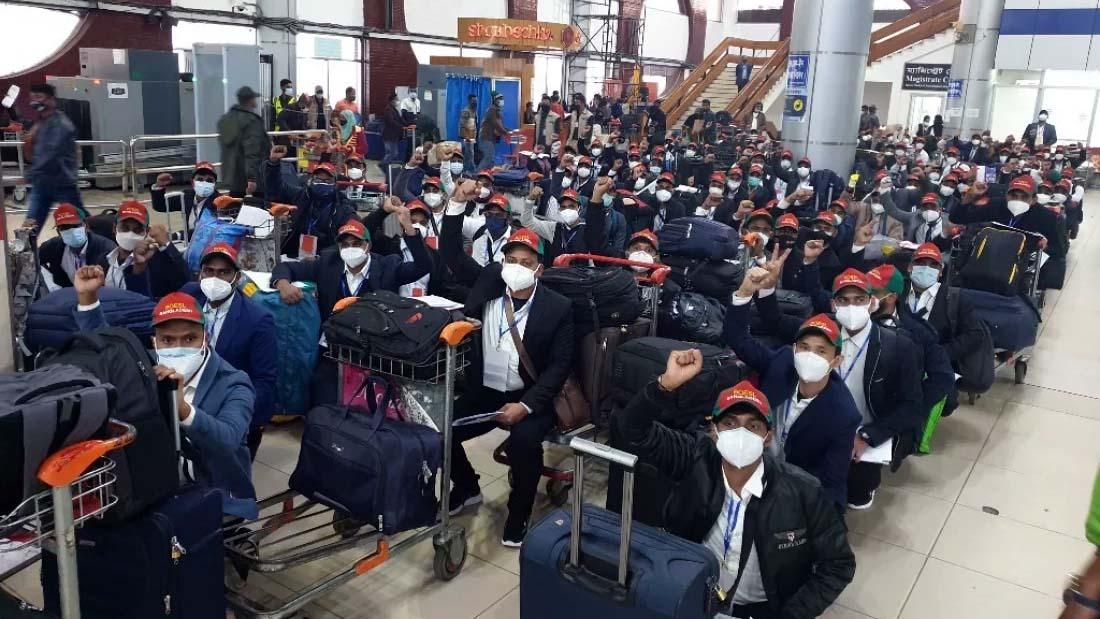Bangladesh’s manpower export dropped 24 per cent during 2024 calendar year as the country exported a total of 997,008 workers during January-December period (January 1– December 29, 2024) during the currant calendar year compared to a total of 1305,453 workers sent during previous year 2023, according to the data of Bureau, Manpower, Employment and Trading (BMET).
The global economic slowdown, war in some middle-east countries and halt of manpower import by Malaysia and Oman have caused the slowdown in manpower export of Bangladesh during 2024, according to the Bangladesh Association of International Recruiting Agencies (BAIRA) leaders and officials of Bureau, Manpower, Employment and Trading (BMET).
Saudi Arabia was the top destination of Bangladeshi workers with 615,487 workers (over 61.73 of the market share), followed by Malaysia with 93,631workers (9.39 per cent), Qatar with 73,959 (7.41), UAE with 47,187 workers (4.73pc), Singapore with 56,210 (5.63), Jordan with 15,330 workers (1.53%), Kuwait with 32,730 workers (3.28), Italy with 1162 workers (0.11), Japan 1079 (0.10 % ) and the UK with 3547 workers (0.35%) and Oman with 358 (per cent), according to data of BMET.
Bangladesh should explore a new labour market next year as the manpower export to Malaysia—the second largest destination of Bangladeshi workers after the Kingdom of Saudi Arabia – has remained closes since June, 2024, said a top BAIRA leader while talking to this correspondent.
Deputy High Commissioner of Bangladesh High Commission in Kuala Lumpur, Malaysia Khorshed Khastagir while talking to this correspondent recently said that the Bangladesh is working to reopen the market in new Year 2025.
Bangladesh exported a total of 93,631workers (9.39 per cent) in 2024 as against a total export of 351, 683 (26.94) workers in 2023.
Malaysia recruited a total of 21,009 workers in October, 21,520 workers in September, 46,105 workers in August, a total of 40,329 workers in July, a total of 41,438 workers in June and a total of 35,190 workers in May.
Currently, Bangladeshi workers are getting recruited in all sectors in Malaysia, including plantations, agriculture, manufacturing, services, mining, construction and household services.
Bangladesh achieved a record manpower export of 1305,453 workers to different countries in 2023, surpassing the previous record of 1135,873 in 2022, according to the Bureau of Manpower, Employment and Training (BMET).
Foreign job placements had been in decline since June this year due to political turmoil surrounding a student-led uprising and the closure of the Malaysian labour market.
Meanwhile, Bangladesh is preparing to send the first batch of trained nurses to Saudi Arabia by early next year, the country’s state-owned recruiting agency told Arab News.
Bangladeshi nationals make up the largest group of expatriates in Saudi Arabia, with nearly 3 million working and residing in the Kingdom. But only a few dozen clinicians are among the group, according to Bangladesh Medical Association data.
In 2022, the two countries signed an agreement on the recruitment of health workers, targeting the large numbers of certified doctors, nurses and medics from Bangladesh’s more than 100 medical colleges.
Bangladeshi authorities are now preparing a batch of over 100 nurses to send to Saudi Arabia, said the Bangladesh Overseas Employment and Services Ltd., a recruitment agency under the Ministry of Expatriates’ Welfare and Overseas Employment.
“We got a request to send 150 nurses to the Kingdom … If everything goes alright, we can expect the first batch to (fly out) to the Kingdom early next year,” BOESL Executive Director Shawkat Ali said.
In Saudi Arabia, nurses must undergo the Saudi Prometric Exam in order to practice in the Kingdom. Though Bangladesh has many nursing school graduates, most do not have the required Prometric certifications, he added.
“Our nurses are very skilled and industrious … We have received huge queries for the nurses. But here they need to have the Prometric certification. If we can prepare them in line with the Saudi requirements, it will open new opportunities for our nurses.”
Only around 2 percent of Bangladeshi workers in the Kingdom are skilled professionals, but the number has been on the rise since the beginning of the year, according to data from the Bureau of Manpower, Employment and Training.
Though most Bangladeshi migrant workers are seeking employment in Saudi Arabia’s giga-projects under its Vision 2030 transformation plan, there has also been a growing demand for health workers from the South Asian nation.
“For our economy, exporting trained nurses to the Kingdom is a big opportunity. We are mostly an import-dependent country, so we need huge amounts of dollars to meet the import bills,” Ali said.
“If we can export a significant number of trained medical staffers, they would be able to send back more remittances.
Meanwhile, Saudi Arabia's Ambassador to Bangladesh Essa Yousef Essa Al Duhailan while talking to the Dazzling Dawn that the mission is issuing 5000-6,000 visas to Bangladeshis every day.
Essa Yousef Essa Al Duhailan said that KSA is interesting recruitment of skilled manpower like nurses in the health sector of the Kingdom of Saudi Arabia.
He said Bangladesh should concentrate on skilled power like electricians, masons, carpenters, painters and health technologists to the middle east market.
The trend of overseas employment is satisfactory so far and we are expecting to send more remittance senders with jobs this year,” Director of Bureau of Manpower Employment and Training (BMET) Mamun Sarder said.
Talking to the newsmen, Deputy Director (ongoing charge) of BMET Mohammad Jahirul Alam Majumder said the inflow of remittance has tremendously increased as expatriates’ income has also increased for the last nine consecutive months.
The government set up many training centres in different districts along with skill development programmes to create skilful jobseekers.
The government also encouraged documented overseas employment, as an important component of earning foreign currency.
The government is providing various trainings including diploma in ship building engineering, refrigeration and air-conditioning, general mechanics, electrical machine maintenance, auto CAD 2D and 3D, welding (6G), catering, mason, Korean, Arabic, canton, Japanese language and others.
Earlier, the government declared the overseas employment sector as a “thrust sector” with maximum stress upon further expanding job markets for the Bangladeshi job seekers abroad.
"Many mega projects have been initiated in Saudi Arabia, which has created a demand for labour, and visa trading is going on taking advantage of this," Reaz-ul-Islam, immediate past senior vice president of the Bangladesh Association of International Recruiting Agencies (Baira), said.
"Fake demand letters are often issued for visa trading, resulting in more people going than necessary. And everyone is not getting work," he added.
Saudi Arabia led global construction activity in the first quarter, with a $1.5 trillion pipeline of unawarded projects, according to data analysed by JLL, a real estate services company.
The latest report from the company reveals that the Kingdom accounted for a 39% share of the total construction projects in the Middle East and North Africa region, valued at $3.9 trillion, as reported by Arab News in June this year.
Within the Kingdom's pipeline, the construction assets sector represented 62%, or $950 billion, of the overall projects, while transportation, infrastructure, and other utilities accounted for 38%, or $582 billion, as noted by JLL, citing insights gathered from MEED Projects.
Saudi Arabia is the largest destination for Bangladeshi workers, employing around 3 million, mostly in the construction and service sectors as cleaners and housemaids, according to BMET.
Shamim Ahmed Chowdhury Noman, former Secretary General of Baira, said, "There is a kind of instability in the entire labour market due to the high iqama fee, even though there is enough work. This issue needs to be resolved quickly by reducing the iqama fee."
Every day, between 350 and 400 migrant workers return to Bangladesh, many of them facing a difficult reality. Of the returnees, 70% come from Saudi Arabia, the largest destination for Bangladeshi workers, driven home by the skyrocketing cost of work permits, according to the Brac Migration Program.
Known as the iqama fee, it now stands at an eye-watering 11,000 Saudi riyals per year – more than the annual income of many employed in domestic work, construction, or cleaning.
"Employers struggle to pay such large sums, especially for 100 or 1,000 workers at a time," said Noman Chowdhury. He further stated that this situation has worsened over the past year and a half, with 60-70% of foreign workers, including Bangladeshis, now lacking valid iqamas.
The Baira leader has written to Chief Adviser Professor Muhammad Yunus, urging him to leverage his international stature to persuade Saudi authorities to reconsider the iqama fees.
After Saudi Arabia, Qatar recruited the second-highest number of workers at 6,507, followed by Singapore, Kuwait, and Jordan.
Remittance inflows to Bangladesh reached $2.39 billion in October, marking a significant 21.32% year-on-year increase from $1.97 billion last year, according to Bangladesh Bank data.
This rise follows a trend seen over recent months, with remittances in September hitting a similar figure of $2.4 billion.
Though the price of the dollar in the remittance market has slightly declined in the past two weeks, it has not significantly impacted inflows.
Stakeholders attribute this to the confidence remitters have in the current government, as they observe a noticeable decrease in capital flight from the country.
Meanwhile, Bangladesh received nearly $27 billion in remittances this year – reflecting a 22% year-on-year increase – bolstered by a 9% rise in the official dollar rate and a decline in money laundering during the final five months.
According to data from the Bangladesh Bank, remittances through formal channels totalled $26.67 billion from January to 28 December, an increase of about $4.7 billion from $21.92 billion in 2023.
To understand this year's remittance inflow, consider this: While Bangladesh received over $2 billion in remittances in just two months last year, the country surpassed $2 billion in all 11 months this year, except July when internet and banking disruptions related to a mass uprising and expatriates' solidarity affected inflows.
As of 28 December, the latest remittance total is $2.42 billion, ranking second in the highest remittance months in history. The highest remittance, $2.59 billion, was received in July 2020 during the Covid period.
According to central bank data, the country's gross foreign exchange reserves reached $21.33 billion yesterday, as per the IMF formula based on the Balance of Payments and International Investment Position Manual (BPM6).
Husne Ara Shikha, spokesperson for the Bangladesh Bank, told The Business Standard that the demand for hundi has decreased in recent months due to reduced money laundering.
As a result, a significant portion of remittances previously channelled through hundi – an informal cross-border money transfer system that bypasses the legal banking channels – is now coming through formal channels.
Additionally, the gap between the dollar rates in formal and informal channels has narrowed to nearly Tk1 due to the rise in the official dollar rate and reduced demand.
"Overall, we consider the growth in remittances to be positive, and we expect an even better inflow next year," said Shikha, also an executive director of the central bank.
Dollar rate, falling hundi demand: Key drivers of remittance growth
Senior officials at several banks told TBS that the remittance market is highly sensitive to exchange rates. When the dollar rate rises, remittance inflows tend to increase.
September 2023 serves as a clear example: banks were instructed not to collect remittances at higher rates, and the central bank penalised the treasury heads of at least 10 banks for buying remittance dollars at inflated rates. As a result, remittances in September 2023 totalled only $1.33 billion.
However, after the interim government took power in August 2024 and increased the dollar rate, banks faced less pressure on remittance collection. This shift is now yielding positive results.
Analysis of central bank data shows that in early January 2024, the official dollar rate was Tk110. In the July-December monetary policy, the central bank devalued the currency by Tk7 – the largest single-day devaluation in history.
Banks were then instructed to buy and sell dollars based on a crawling peg mid-rate of Tk117, with verbal guidance to add a maximum of Tk1, bringing the rate to Tk118.
After the interim government took office in August, the rate was increased to Tk120. By December, the dollar rate rose to Tk128, but the central bank's verbal instructions capped transactions at Tk123. This represents an increase of at least Tk10 or 9%.
Bankers said this upward trend in the dollar rate has contributed to the rise in remittances.
Fahmida Khatun, executive director of the Centre for Policy Dialogue, told TBS that the dollar rate is crucial in driving remittance inflows. When the dollar rate increases, remittances tend to rise.
Additionally, demand for hundi has declined since the interim government took office in August, though this change may be temporary. Khatun explained that it is difficult to reduce hundi demand in the long term due to the involvement of various international networks.
To further boost remittance inflows, the economist suggested offering social recognition to remitters alongside providing a favourable dollar rate.
She proposed initiatives such as improving transportation for returning expatriates, including facilitating access to bus terminals, as a way to encourage remittances through formal channels.
"If this recognition is given, remitters will be more likely to send money through official channels," she added.








.svg)
